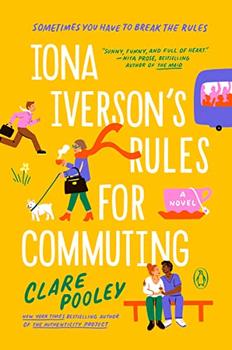Summary | Excerpt | Reading Guide | Reviews | Beyond the Book | Read-Alikes | Genres & Themes | Author Bio

A Novel
by Clare PooleyThis article relates to Iona Iverson's Rules for Commuting
 Walk into any office and you'll likely find a mix of people at different points of their lives: Baby boomers, Generation Xers, millennials. And the presence of Generation Z continues to grow.
Walk into any office and you'll likely find a mix of people at different points of their lives: Baby boomers, Generation Xers, millennials. And the presence of Generation Z continues to grow.
Iona, the main character in Clare Pooley's Iona Iverson's Rules for Commuting, often experiences people judging her competencies based on her age. She's on the older side, some feel she's past her prime, and she tries desperately to prove them wrong. But what do generational identities say about our capabilities as workers? To tackle this question, we'll first have a look at the impact our generational differences have on us in the workplace, and then delve into the truth of the issue.
How do generational differences affect us in the workplace?
It isn't hard to notice the differences between one age group and another: music, communication methods and even values. These differences can manifest themselves in a negative way in the workplace and cause us to argue, taking work from productive and efficient to a situation of lowered engagement. Soon enough, this can become frustrating, and we may have a tendency to blame our generational differences for it, especially if we already hold biases towards one another based on our ages.
The truth
Though some employees may think that they are simply unable to work with a person who isn't in the same stage of life as them, or that some generations are less reliable, our distinctions in work patterns and capabilities aren't as accentuated as all that. Research has indicated that the correlation between our generational upbringing and the way we act in and experience the workforce is close to zero, meaning there is little difference in attitudes towards work between generations.
When different generations do find it difficult to work together, this may stem from stereotypes, or the fear people have of what others think of them due to said stereotypes. For example, in one experiment, trainers were asked to teach technological tasks to people who, through a combination of photographs and voice technology, were manipulated to appear as if they fell into particular age ranges. Since the trainers already had lower expectations of the "older" workers, this affected how they interacted with them and the results of the training were less favorable.
How to deal with it
In order to not hinder our productivity, it is important that we tackle stereotypes and our assumptions of others. Dismantling the reasoning behind them can bring us a step closer to overcoming them.
Megan Gerhardt, a management professor at Miami University, has researched the impacts of generational differences in the work field. "Many of the generational conversations in the news today rely on false stereotypes and clickbait headlines, rather than taking the time to understand the important differences that are a part of our generational identities," she claims.
To create the best work environment possible, we must comprehend that at the end of the day, we're all different people. And this is entirely normal.
People of different ages working together, by Andrea Piacquadio
Filed under Society and Politics
![]() This "beyond the book article" relates to Iona Iverson's Rules for Commuting. It originally ran in June 2022 and has been updated for the
August 2023 paperback edition.
Go to magazine.
This "beyond the book article" relates to Iona Iverson's Rules for Commuting. It originally ran in June 2022 and has been updated for the
August 2023 paperback edition.
Go to magazine.
The longest journey of any person is the journey inward
Click Here to find out who said this, as well as discovering other famous literary quotes!
Your guide toexceptional books
BookBrowse seeks out and recommends the best in contemporary fiction and nonfiction—books that not only engage and entertain but also deepen our understanding of ourselves and the world around us.